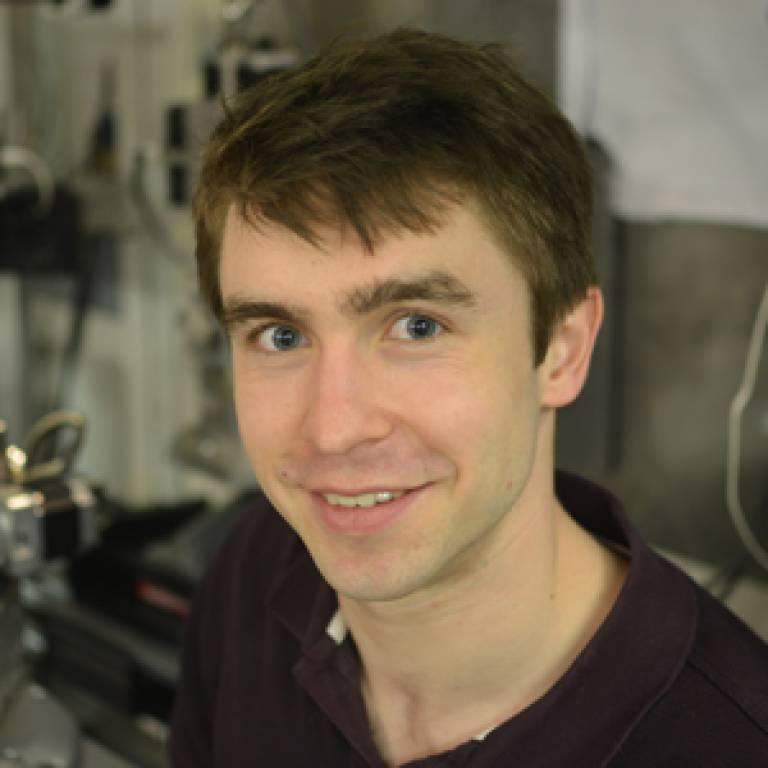Seven questions with Donal Finegan
14 May 2015
This week we put seven questions to Donal Finegan, a PhD student from UCL's Electrochemical Innovation Lab.

Research project: Time resolved tomography of lithium-ion batteries during operation and failure.
Department: UCL Chemical Engineering (Electrochemical Innovation Lab)
Members of team: Donal Finegan, James Robinson, Bernhard Tjaden, Dami Taiwo, Rhodri Jervis, Tom Mason, Jason Millichamp, Toby Neville, Mario Scheel, Marco Di Michiel, Ian Hunt, Gregory Offer, Gareth Hinds, Dan Brett and Paul Shearing.
Tell us more about your research project:
Our research involves using advanced diagnostic techniques such as X-ray Computed Tomography (CT), thermal imaging and electrochemical spectroscopy to identify features that affect the safety, reliability and performance of commercial lithium-ion batteries.
X-ray CT is a non-destructive X-ray imaging technique that allows visualisation of materials in 3D. The most prevalent and recognisable application of X-ray CT is for medical imaging in hospitals but it is also frequently used for material diagnostics where advanced X-ray sources such as synchrotrons (e.g. the European Synchrotron Radiation Facility (ESRF) in France, or Diamond Light Source in the UK) can achieve 3D images (tomograms) with sub-micron spatial resolutions in very little time.
Sequential 3D images allow us to visually inspect and quantify the evolution of materials over time, for example the swelling and contraction of active materials within lithium-ion batteries. Our work involves using X-ray CT at the ESRF to follow the behaviour of the internal architecture of commercial lithium-ion batteries leading up to and during catastrophic failure.
Combined with thermal imaging this has
provided an unprecedented insight into the structural and thermal behaviour of
commercial lithium-ion batteries during failure, which is expected to guide the
design and development of safer and more reliable batteries.
The study can be viewed in full on the Nature Communications website.
What makes it so important (and interesting)?
Catastrophic failures of modern lithium-ion batteries are extremely rare but recent high profile incidents involving the failure of lithium-ion batteries have emphasised the need to make commercial batteries even safer. This comes at a time when lithium-ion batteries are being pushed to their limits in terms of operation and performance, particularly in the automotive industry.
The safety and reliability of cells is of utmost importance for their success in increasingly demanding applications, and through understanding the dynamics associated with failure we can start to think about designs to prevent or mitigate the consequences of rapid failure modes such as thermal runaway.
What has been a personal highlight so far?
Using large-scale facilities such as the ESRF is definitely the highlight of this work. The facilities, technology and people there are outstanding. As time at the ESRF is so valuable, our stay involved working throughout the nights, which, with a good team of colleagues, was a pretty fun experience.
Naturally, as our heads start to slump forward onto the keyboard, we start to look forward to the end, but in retrospect it's excellent. Getting a brief look at the beautiful Alps is an added bonus too.
Explain some of the challenges involved in working on a research project.
Most of my work involves using large-scale facilities outside UCL, for which it can sometimes be challenging to get time. When time at a synchrotron X-ray facility is granted, the major challenge of developing a detailed experimental design and plan is posed. It can sometimes take several months of preparation to make sure we make the most of our time there.
Of course, for every experiment months of data analysis follows, which is often a tedious task, and on top of this there's the challenge of finding a comfortable adjustment of my chair.
What advice would you give to an undergraduate student hoping to pursue a research career?
I'm sure advice can vary a lot between degrees but I'll speak from my own experience in seeking a PhD position in engineering with the caveat that it may not be applicable to other departments. Don't feel rushed into a position - the most important thing is to find something that captures your interest.
After that, if possible, it's always good to get to know the group. This may be difficult if you're aiming to go to another university but generally current researchers in the group are always willing to provide prospective students with an insight into their work. A PhD is quite a commitment that deserves careful thought and gathering as much information as possible.
Any idea what's next after the project finishes?
That really depends on what we find over the next year. For example, if there are consistent failure mechanisms it may become obvious that a certain design feature would complement the safety of cells, in which case I'd like to trial new designs.
Equally, if failure mechanisms are found to be related to abuse testing conditions it may be necessary to review current standards in battery safety testing. In any case, there is still a lot to learn about how battery materials behave under abuse conditions. As it stands, the finish line is blurry at best.
Describe your perfect evening (or weekend) after a long week.
Being in the company of family or good friends.
Find out more about Donal's research in the following video, which demonstrates what happens when lithium-ion batteries overheat and explode:
 Close
Close

